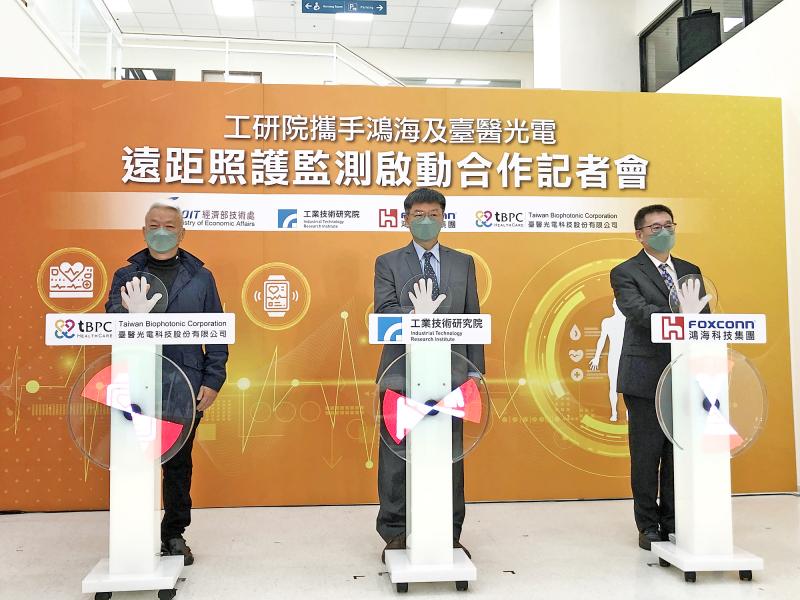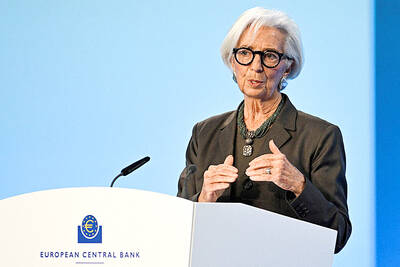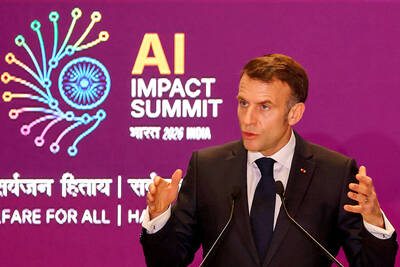Hon Hai Precision Industry Co (鴻海精密), which has intensified efforts to extend its reach beyond contract production, has set its sights on the Southeast Asian market for digital healthcare devices, a senior company official said yesterday.
The company would use the Taiwanese market as a launchpad for digital healthcare device development, and is planning to test the waters in the Southeast Asian market next year at the earliest, Chiang Chih-hsiung (姜志雄), head of the iPhone assembler’s B business group, told reporters.
Chiang made the comments after Hon Hai earlier in the day signed an agreement with Taiwan Biophotonic Corp (臺醫光電) and the government-sponsored Industrial Technology Research Institute (ITRI, 工業技術研究院) to develop a long-distance healthcare monitoring platform.

Photo: CNA
Under the agreement, the three partners are to build a digital healthcare ecosystem in Taiwan.
Hon Hai aims to take advantage of its strength in information and communications technology to develop digital healthcare devices and create value-added smart medicare gadgets, Chiang said.
The company’s vision involves developing a long-distance healthcare monitoring platform by integrating its hardware and software expertise, as well as the physical and virtual technologies it has mastered, including app interfaces and cloud-based applications, to help medical personnel monitor patients from a distance, he said.
Before entering the Southeast Asian market, Hon Hai is expected to conduct a clinical test for the monitoring platform that would last about one year, Chiang said, adding that the new system would need to be certified by the health authorities in the markets it enters.
ITRI executive vice president Alex Peng (彭裕民) said that the establishment of the Taiwan Integrated Biomedical Industrial Center by the Ministry of Economic Affairs paved the way for closer ties with Hon Hai and Taiwan Biophotonic.
The three are expected to conduct clinical tests for the monitoring platform in New Taipei City’s Tucheng Hospital, Peng said.
Negotiations are also being held with Chang Gung Memorial Hospital and several elderly care centers for broader cooperation, in a bid to accelerate the speed at which new devices hit the local market and enter international markets, Peng added.
Chiang said that Hon Hai would seek further cooperation in developing heartbeat, blood oxygen and blood sugar monitors, as well as electrocardiography devices.

European Central Bank (ECB) President Christine Lagarde is expected to step down from her role before her eight-year term ends in October next year, the Financial Times reported. Lagarde wants to leave before the French presidential election in April next year, which would allow French President Emmanuel Macron and German Chancellor Friedrich Merz to find her replacement together, the report said, citing an unidentified person familiar with her thoughts on the matter. It is not clear yet when she might exit, the report said. “President Lagarde is totally focused on her mission and has not taken any decision regarding the end of

French President Emmanuel Macron told a global artificial intelligence (AI) summit in India yesterday he was determined to ensure safe oversight of the fast-evolving technology. The EU has led the way for global regulation with its Artificial Intelligence Act, which was adopted in 2024 and is coming into force in phases. “We are determined to continue to shape the rules of the game... with our allies such as India,” Macron said in New Delhi. “Europe is not blindly focused on regulation — Europe is a space for innovation and investment, but it is a safe space.” The AI Impact Summit is the fourth

CONFUSION: Taiwan, Japan and other big exporters are cautiously monitoring the situation, while analysts said more Trump responses ate likely after his loss in court US trading partners in Asia started weighing fresh uncertainties yesterday after President Donald Trump vowed to impose a new tariff on imports, hours after the Supreme Court struck down many of the sweeping levies he used to launch a global trade war. The court’s ruling invalidated a number of tariffs that the Trump administration had imposed on Asian export powerhouses from China and South Korea to Japan and Taiwan, the world’s largest chip maker and a key player in tech supply chains. Within hours, Trump said he would impose a new 10 percent duty on US imports from all countries starting on

STRATEGIC ALLIANCE: The initiative is aimed at protecting semiconductor supply chain resilience to reduce dependence on China-dominated manufacturing hubs India yesterday joined a US-led initiative to strengthen technology cooperation among strategic allies in a move that underscores the nations’ warming ties after a brief strain over New Delhi’s unabated purchase of discounted Russian oil. The decision aligns India closely with Washington’s efforts to build secure supply chains for semiconductors, advanced manufacturing and critical technologies at a time when geopolitical competition with China is intensifying. It also signals a reset in relations following friction over energy trade and tariffs. Nations that have joined the Pax Silica framework include Japan, South Korea, the UK and Israel. “Pax Silica will be a group of nations